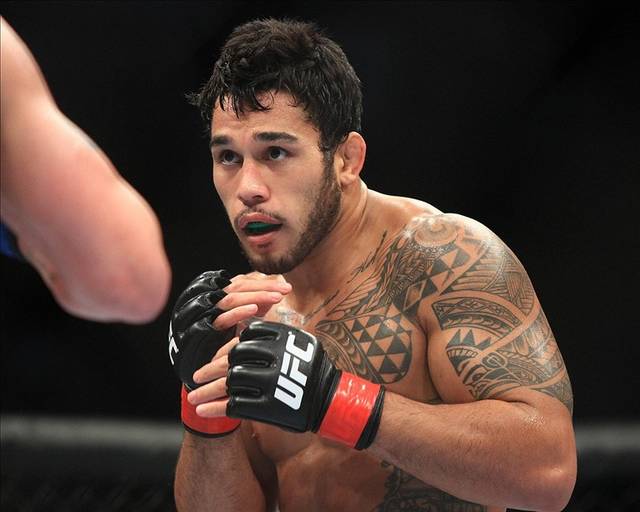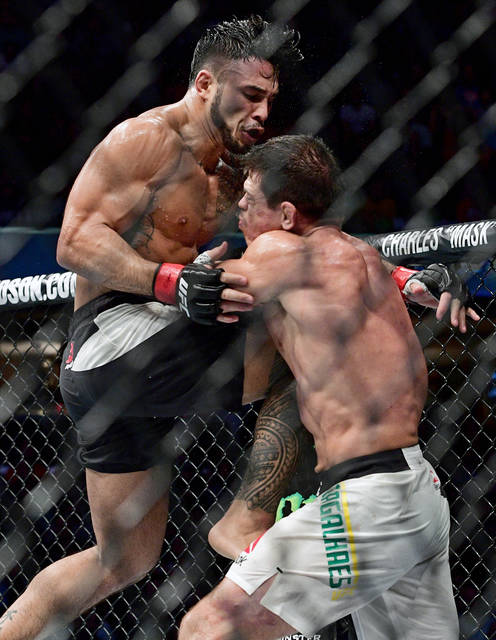Hilo’s Brad Tavares doesn’t do any dancing in a mixed martial arts cage, like hit-and-run or circle an opponent until he falls from a dizzy spell.
The UFC middleweight has made his living introducing opponents to his Hawaiian hammer, which has led to a steady climb up the 185-pound division.
Tavares (14-4) takes on Canada’s Elias “The Spartan” Theodorou (14-1) at The Ultimate Fighter Finale on Friday in Las Vegas, the adopted home for the 2005 Waiakea grad.
Theodorou has a unique fighting style. He squats down, springs up and sways his hips like some sort of hypnotic salsa dance. Basically, it helps his timing and rhythm.
Tavares doesn’t need such fancy dancing.
In his last fight against Caio Magalhaes, a split-decision victory, Tavares had to exercise a ton of patience because “Hellboy” kept fighting backward or, as MMA blog experts like to note, he was playing a counter-attack game.
That was on the prelim card at UFC 203 last September in Cleveland. Now, 10 months later, Tavares is on the main card, looking for his third win in his last four bouts.
Theodorou registered a unanimous decision over Cezar Ferriera at UFC Fight Night 105 in February. The Spartan chased most of the time, scored points with significant blows and escaped a locked-in guillotine attempt in the third round.
“I’m feeling good. My mindset is like always. I’m going to war,” Tavares said. “His style is a little bit awkward, and it works to his advantage. You’re not used to seeing that type of movement. His timing is really different.
“It’s something I’ve been preparing for. I know what’s coming and what to do. It’s something I’m ready to deal with. Trust me, I’m not going backward. If I do go backward, it’s to set something up.”
One reason Tavares has been able to employ his stand-up attack is because his takedown defense is so good. His takedowns defended is 75 percent, according to the UFC’s stats; Theodorou is at 44 percent.
Tavares kept stuffing Magalhaes’ attempts, frustrated him and forced him to change tactics. In the third round, Tavares punished him with clean shots on attacks and off clinches.
The Spartan doesn’t look like he has the punching power of Tavares or Magalhaes. But Theodorou only has one loss, a unanimous decision defeat to Thiago Santos in 2015.
To borrow a baseball analogy, everyone in the major leagues can hit a 95-mph fastball. That’s why they are there among the best in the world. It’s the same thing in the UFC, where there are no tomato cans.
“He’s definitely a tough guy, not to be overlooked,” Tavares said. “You have to pick your spots. That’s very important. Some guys go crazy, and it pays off or you could gas out and get hurt. You’ve got to be smart and patient.”
Back when he was at Waiakea, Tavares didn’t wrestle or go out for judo. Instead, he played football and paddled canoe in the BIIF.
But he’s a quick study and received ground-floor training when he moved to Oahu to join Hawaii MMA Development in 2007. Tavares credits coach Rob Hesia for setting the foundation for his wrestling skills.
Then Tavares later moved to Las Vegas to hop into four-time national champion wrestler and UFC Hall of Famer Randy Couture’s gym, Xtreme Couture. The move to Nevada has been a jackpot for Tavares. He’s 4-1 fighting from home.
“I didn’t wrestle a day in my life before I joined the Hawaii fight team,” Tavares said. “I couldn’t take anybody down to save my life. I wished I wrestled in high school. Rob really helped my wrestling, and I’ve come a long way.”
Tavares has two rear-naked choke submissions on his resume and a lot of support when he fights in his back yard.
Benefits of Vegas
About a half-dozen family members and friends are flying from Hilo to watch Tavares flight and enjoy a quick vacation. There’s also the Hawaii transplants in Vegas who cheer on the local 808 boys.
When Tavares fights far from home, there’s rarely that type of support. But at least the UFC covers his travel and hotel bills for six days. The multimillion-dollar organization can afford it.
According to a mmajunkie.com report, the UFC generated a profit of $462 million in 2015. The UFC’s seven-year, $700 million contract with Fox, which doesn’t include pay-per-views, expires in 2018. The next deal is expected to top that.
The UFC foots the travel and hotel bill for a fighter and one corner for six days. Most fighters prefer two corners and will pay to have an extra guy as Tavares did in Cleveland.
Dream card
Like fellow local boys and UFC fighters Max Holloway and Yancy Medeiros, Tavares wants to be on the inaugural UFC Hawaii card someday.
However, a recent structural review stated that 50,000-seat Aloha Stadium “is now a liability to fan experiences, a potential danger to public health and safety and a financial burden for maintenance and operations.”
UH-Manoa’s Stan Sheriff Center’s seating capacity is 10,300, much too small for UFC stadium standards. Maui’s War Memorial Stadium’s seating capacity is 29,181. There are no adequate venues on the Big Island.
Still, that can’t stop a local boy from dreaming.
“Between the state and UFC, they have to figure it out and make it happen,” Tavares said. “UFC Hawaii has to happen. The Hawaii boys have been on the rise. It started off with somebody like BJ Penn. He’s one of the true pioneers. There’s Kendall Grove, Kimo Leopoldo and a steady influx of Hawaii guys getting into the UFC.
“I’m so happy for Max that we’ve got a UFC champion from Hawaii again. I’m happy for Yancy, too. The Hawaii boys have shown that we can bring it.”
The humble local boy from Hilo wouldn’t mention himself in the aforementioned statement. Instead, Tavares will let his Hawaiian hammer do all his talking at The Ultimate Fighter Finale on Friday.









